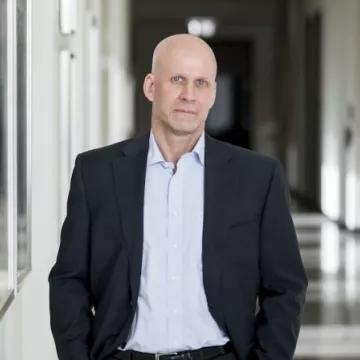An Opening Day Predicament—Will Baseball Fans Side with Billionaire Owners or Millionaire Players?

A percolating labor showdown between well-heeled Major League Baseball team owners and well-paid baseball players threatens spring training and Opening Day. For the time being, it is an amicable negotiation to carve a new Collective Bargaining Agreement in time for the 2022 season, but it could turn sour, as these things tend to do.
As usual, the fans are in that empty, helpless space between billionaire owners and millionaire players.
“There’s still a little bit of time here before panic and pressure set in,” said Mike Lewis, Goizueta professor of marketing and a national expert on fandom who also serves as the faculty director of the Emory Marketing Analytics Center (EmoryMAC). “If we get to Opening Day and there is no baseball that is going to be a major shock to the system, and it is going to have major ramifications.”
Lewis explains, “Fandom is built by the epic moment, the walk-off home run and the spectacular catch, but fandom is also hurt by the epic failure, such as canceling Opening Day. You might not see it in the data for this season, but it is going to be a hit on the fans’ long-term appreciation for their team.”
So, whose side should fandom be on? The billionaire owners or the many millionaire players?
The Baseball Collective Bargaining Agreement, Explained
Lewis spells out the current baseball dilemma. Players want to reduce the time they have to wait to enter full free agency, which is currently six seasons. The players also want teams to be able to spend at least $245 million a season, per team, on salaries before MLB hits the clubs with a luxury tax, which is a way to keep rich teams from buying all the talent.
The luxury tax ceiling is currently $210 million. Players are not happy with the luxury tax because it resembles a “soft” salary cap, or a limit on their pay.
“A lot of what the players are looking for is the freedom for the owners to spend,” Lewis says. “And more freedom for the owners to spend is going to make the competitive balance issues in Major League Baseball worse.”
Do the fans really want that the players to win this labor fight?
Major League Baseball instituted a luxury tax system in 2002 with a new Collective Bargaining Agreement that charged a fee to teams whose payrolls passed a certain threshold. It was done to keep clubs like the Yankees, Red Sox, Dodgers, and Cubs with their massive local television revenues from stockpiling all the stars, Lewis explains.
He goes on to say that the luxury tax penalty has slowly lost its effectiveness because revenues have grown in MLB. The rich teams shrug at the tax and the results have been awful for competitive balance in the game. Fans of less wealthy teams despair in this state of oligopoly in baseball.
There have been as many 100-loss teams in the past three full seasons (2018, 2019, 2021) as there were from 2007-2017 combined (11). Good players flee the less wealthy teams, losses pile up, and fans are put off.
If we move back to the wild west with the market it is going to be harder to keep the franchise superstar in town.
“We know what the system’s going to look like with a more open market. It’s going to look like the New York Yankees dominating, as they did in the late 90s and early 2000s. It’s going to look like Alabama in college football.”
If the players have their way in this latest bargaining, they will be “stuck” for just three or four years with the team that drafts them, not six, before they hit free agency.
Morgan Ward, Goizueta assistant professor of marketing with a research focus on consumer behavior, said the labor tussle between wealthy owners and wealthy players is a “rich people problem” that threatens the “folklore” of the game.
“I think it could have a really alienating effect overall on the general public just because it changes the focus of the game, it takes something very communal and familial and makes it very transactional,” Ward says. “It can be very distancing for the fans and, if anything, illustrates the schism between the fans and these players. These are not your friends or neighbors. They are in a very different place in life.”
So, Will Fans Side with the Owners?
It’s more complicated than that. “The fans have an emotional attachment with the players and no real emotional attachment with the owners,” Ward says.
What the Major League Baseball Players Association, or the union, better not count on, Ward notes, is the fandom rallying to the players just because we have seen a national shift toward worker’s rights that arrived with the COVID-19 pandemic. One of those shifts was college athletes, at last, being able to make money off their name, image, and likeness.
Labor has been humanized on a certain level, but even though the baseball players are “labor” and in a “union,” Ward says there is no comparison between the fight for college athletes against the majordomo NCAA, the governing body of college athletics, and baseball players against baseball owners.
“The public is sympathetic with people in low-wage, high-service industries that finally have the ability to negotiate,” Ward says. “But it’s hard for me to see the same victimization of baseball players that happened with college athletes.”
The last time there was a prolonged labor dispute between the owners and players, which was in 1994, it was disastrous for baseball. The players went on strike in August that season, which canceled the World Series. Average attendance per game that season was a then-record of 31,256. It took 10 years for baseball to average more than 30,000 fans to a game because fans became disgusted with the owners and players.
“How much should we expect fans to endure this time?” Lewis asks.
“They just came off Covid when there were restrictions on attendance and a shortened season,” Lewis said. “This stuff adds up. The fan is going to say, ‘Why am I loyal to these guys?’”
If you're a reporter looking to know more - then let us help.
Professor Mike Lewis is an Associate Professor of Marketing at Emory University’s Goizueta Business School and is an expert in sports analytics and marketing.
Morgan Ward is an Assistant Professor of Marketing at Emory University’s Goizueta Business School and is an expert in consumer behavior.
Both experts are available to speak with media - simply click on an icon to arrange a discussion today.

